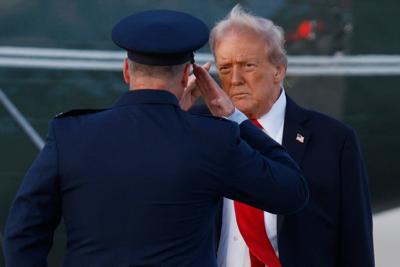WASHINGTON (AP) ŌĆö The Trump administration on Monday asked the Supreme Court for an emergency order to keep billions of dollars in foreign aid frozen.
The crux of the legal fight is over nearly $5 billion in congressionally approved aid that President Donald Trump last month said he would not spend, invoking disputed authority that was last used by a president roughly 50 years ago.
Last week, U.S. District Judge Amir Ali ruled that the Republican administrationŌĆÖs decision to withhold the funding was likely illegal.
Trump told House Speaker Mike Johnson, R-La., in a letter on Aug. 28 that he would not spend $4.9 billion in congressionally approved , effectively cutting the budget without going through the legislative branch.
He used whatŌĆÖs known as . That’s when a president submits a request to Congress toward the end of a current budget year to not spend the approved money. The late notice means Congress cannot act on the request in the required 45-day window and the money goes unspent.
Ali said Congress would have to approve the rescission proposal for the Trump administration to withhold the money. The law is ŌĆ£explicit that it is congressional action ŌĆö not the PresidentŌĆÖs transmission of a special message ŌĆö that triggers rescission of the earlier appropriations,ŌĆØ he wrote.
The Trump administration has made deep reductions to foreign aid one of its hallmark policies, despite the relatively meager savings relative to and possible damage to AmericaŌĆÖs reputation abroad as foreign populations lose access to food supplies and development programs. The administration turned to the high court after a panel of federal appellate judges declined to block AliŌĆÖs ruling.
Solicitor General D. John Sauer called the ruling ŌĆ£an unlawful injunction that precipitates an unnecessary emergency and needless interbranch conflict.ŌĆØ He urged the justices to immediately block it.
But lawyers for the nonprofit organizations that sued the government said it’s the funding freeze that violates federal law, noting that it has for even the most urgent lifesaving programs abroad.
ŌĆ£This marks the third time in this case alone that the Administration has run to the Supreme Court in a supposed emergency posture to seek relief from circumstances of its own making ŌĆö this time to defend the illegal tactic of a ŌĆśpocket rescission,ŌĆÖ” attorney Lauren Bateman of Public Citizen Litigation Group, lead counsel for the AIDS Vaccine Advocacy Coalition plaintiffs, said in a statement. “The Administration is effectively asking the Supreme Court to bless its attempt to unlawfully accumulate power.ŌĆØ
Justice Department lawyers told a federal judge last month that another $6.5 billion in aid that had been subject to the freeze would be spent before the end of the fiscal year on Sept. 30.
The case has been winding its way through the courts for months, and Ali said he understood that his ruling would not be the last word on the matter.
ŌĆ£This case raises questions of immense legal and practical importance, including whether there is any avenue to test the executive branchŌĆÖs decision not to spend congressionally appropriated funds,ŌĆØ he wrote.
In August, the U.S. Court of Appeals for the District of Columbia Circuit threw out an earlier injunction Ali had issued to require that the money be spent. But the three-judge panel did not shut down the lawsuit.
After Trump issued his rescission notice, the plaintiffs returned to Ali’s court and the judge issued the order that’s now being challenged.
___
Follow the AP’s coverage of the U.S. Supreme Court at .


























